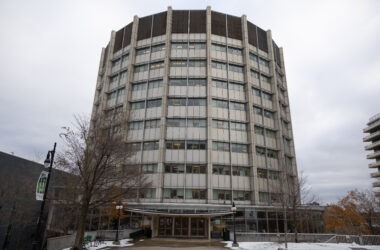In an attempt to utilize the momentum generated by the worldwide march for climate justice on March 15, the organizer of the Montreal contingent, La Planète s’invite à l’Université (LPSU), will hold two more marches in April and September. Additionally, LPSU representatives met with Quebec Minister of Environment Benoit Charette on March 22 to discuss climate change policy.
“Essentially, the meeting today was a lot of empty promises as usual,” SSMU Sustainability Commissioner Alison Gu said. “We expected everything that they said, but they also told us that they were going to approve the Gazoduq pipeline […] which is going to transport liquified natural gas (LNG). The fact is that if we set up more infrastructure to be burning fossil fuels, which is what natural gas is, it’s purported to be [a] cleaner alternative to coal or oil. But, at the end of the day, a lot of the processes that you have to extract and transport LNG are the same or worse than current oil processes.”
Montreal’s protest was one of the largest of the 2,000 marches that took place across the world that day, with 1500 McGill students in attendance. Organizers at McGill began preparing for the demonstration three-and-a-half weeks beforehand. According to Christina Lau, who handled communications for the march, the demonstration was successful due to the dedication of its participants despite a tight time constraint.
“I definitely think [the march’s success was] because everyone in our group was so passionate and so hardworking,” Lau said. “Each of us was going to three or four meetings a week […] for hours to make sure everything was exactly how we wanted it to turn out. Montreal had the biggest march in North America, and I feel like that really speaks to how far we’re willing to go to get [action on climate change], and I think that, especially with the next few [marches] coming up, we will be able to prove to McGill how much students want to protect our planet and [see] concrete action.”
Juan Pablo Arellano, U2 Science, who acted as a point of communication between McGill security, the SPVM, and McGill’s climate demonstration, hopes that the results of the upcoming federal election in October will reflect the momentum of the protests.
“I want to do the best that we can to elect representatives that are aligned with our views and who are pro-climate mitigation, pro-sustainability, and anti-climate change,” Arellano said. “[I want to elect] someone who will try to shift policy to make Quebec more sustainable, more self-reliant, and less fossil-fuel dependent. ”
The impact of climate change on Indigenous communities was an important theme at the demonstration. Alex Allard-Gray, a McGill alumnus and member of the Listuguj Mi’gmaq First Nation, elaborated on how the government can mitigate the impact on Indigenous communities.
“I think the [government needs to make] policies that protect the environment and protect Indigenous lands from being the site of environmental abuse,” Gray in an interview with The McGill Tribune. “Our culture has already been assaulted in so many ways, as we can see in Canadian history, and this is just another way in which we are having our culture progressively taken away from us. We have to fight harder and harder to achieve what we [want].”







